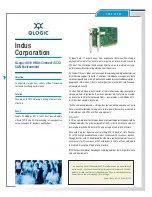
C A S E S T U D Y
Indus
Corporation
QLogic 4010 HBAs Connect iSCSI
SAN Environment
Objective
To separate storage from servers without increasing
costs and sacrificing performance.
Solution
Develop an iSCSI SAN using existing Ethernet infra-
structure.
Result
QLogic SANblade
™
4010 iSCSI host bus adapters
offload TCP/IP and iSCSI processing to free expensive
server resources for business applications.
At Indus Corp., IT experts know from experience that monolithic storage
environments most often have two major points of failure: disk drives and
CPU heat. The challenge then becomes finding a way to maintain cost and
performance while separating storage from the servers.
For the past 15 years, Indus has focused on software engineering and enterprise
infrastructure support to build IT solutions in database management, data
warehousing and data mining. Applications include dynamic Web development,
geographic information systems, convergent communications solutions and
network/data security.
So when Robert Nase, Indus Director of Information Technology, designed a
storage platform to guide the IT services provider into the future, he created
an innovative iSCSI Ethernet-based SAN — powered by six SANblade 4010
iSCSI host bus adapters by QLogic.
“With a computing box and a storage box you can divide and conquer,” said
Nase, who consolidated his storage into several pools. “Essentially, we isolated
the disk drives and CPUs into their own elements.”
Why iSCSI?
iSCSI is a new protocol that enables block-oriented storage data to be carried by
Ethernet networks. The principal benefit of iSCSI is that it simplifies a network
by merging block and file data traffic onto a single Ethernet infrastructure.
Nase said he didn’t agonize over selecting iSCSI instead of Fibre Channel
(FC), with its high bandwidth and almost limitless ability to connect devices.
Though familiar with FC, he believed that the more sophisticated interface was
unnecessary for his company of 500 employees in 12 U.S. offices, and opted
to maintain his existing Ethernet infrastructure.
With this specific mindset, Nase began exploring solutions that met performance
and cost requirements.
“I’ve tried every kind of TOE adapter and NIC, and there wasn’t an acceptable one
on the market; I like QLogic the best for performance and functionality. The other
products just don’t work for cost and performance. When I want to depend on the
transaction rate and error checking, I turn to QLogic.”
Robert Nase, Indus Director of CIO


